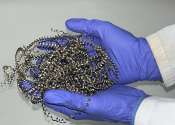Improved mid-infrared nanoscopy enables 30 times clearer view of the insides of bacteria
A team at the University of Tokyo have constructed an improved mid-infrared microscope, enabling them to see the structures inside living bacteria at the nanometer scale. Mid-infrared microscopy is typically limited by its ...









